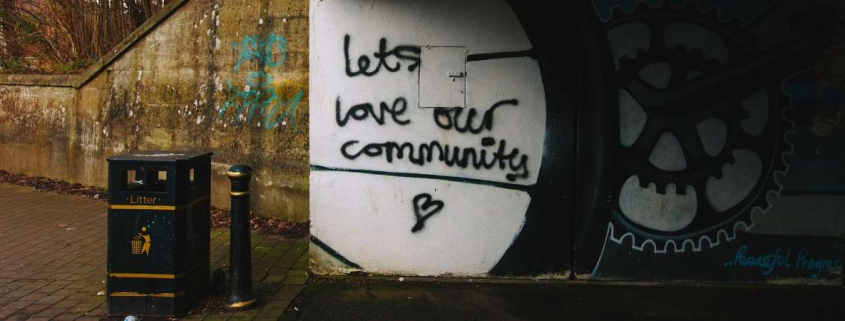The Importance of a Community
After attending the Better Way Roundtable, Amy Middleton, PTS Manager and Coach at Mayday Trust, reflects on the importance of community and real relationships when supporting people going through tough times.
I recently attended a Better Way Roundtable which discussed the topic organisations without ‘walls’ – these are organisations which focus on communities, rather than structures, and solutions not services.
I’ve always known that communities are an integral part of our society, but before working for Mayday Trust I don’t think I gave the topic a deeper level of thought. Reflecting on this now I think about why this may be, and what it comes down to is this question – What do people turn to communities for?
My time is split between going to work, spending time with my partner, and seeing friends and family. Relationships on all different levels are what I believe keep me going and what they provide me with is all encompassing. They make me feel valued and loved, give me a sense of belonging and a purpose, provide me with emotional and even financial support when times are tough, they are ultimately what give my life meaning and direction.
For many of the people that we work with, they don’t have these relationships and informal support networks around them and no amount of formal support services offered are going to provide them with what they truly need to be able lead a fulfilling life. So many people who have experienced homelessness when asked will say that they don’t have anybody to list as a next of kin, so will put a worker’s contact details down instead. I think many of us would find it almost impossible to imagine what it must feel like for the only people in your life to be those that are paid to be there, or those that you have no choice but to socialise with simply because you have a shared circumstance of being homeless.
Of course services exist with good intentions, we want to help and we want to do good, but surely there comes a point when we realise there is a limit to what we can do and we definitely can’t act as a replacement for real connections. These connections are formed organically through shared interests or values that will continue on beyond the life of paid services. Are services actually doing the opposite of what they set out to do, creating dependency with a complete power imbalance whereby we as the service are there to fix people’s perceived problems?
The answer to this has always been obvious, we should be supporting people to create peer support networks and find things they enjoy doing to get involved in. Although with good intentions, efforts have gone array, we have created an endless list of services specifically for people who are homeless, such as homeless GP, football teams and haircuts. In doing this we have segregated people who already feel marginalised even further from mainstream society, which makes that psychological leap out of homelessness even greater.
People will often speak of feeling part of a homeless community and of course it’s understandable that you would turn to others who are going through a similar difficult situation for support, but the issue appears when people start to carry the label of being a homeless person and can’t see beyond that. When people feel that they no longer fit into their existing local community because all they have available to them are services and groups with other ‘homeless people’. As a sector we need to take a step back and ask an awkward question; have we created and perpetuated this problem?
There is also the matter of achieving sustainable change, with sustainable being the operative word. I think it’s fair to say that all organisations within the homelessness sector have the objective to help people move into their own long term independent accommodation, but with everybody trying to meet different KPI’s and outcomes to produce good ‘move on’ data to meet contract requirements, do we not run the risk of pushing people to take a big leap into an unknown and scary world that they are unprepared to cope in?
It happens all too often that people are moved on, into their own accommodation after many years of homelessness, sometimes in a completely new area. We are then surprised when months down the line the tenancy breaks down and we see the same people back in homelessness services to start the whole cycle all over again. We can provide all the practical support to help with managing a tenancy, but if people are socially isolated and feel they don’t have a purpose or a sense of belonging, then of course they are going to return back to what is familiar to them, with people they know, even if that does mean returning to the streets.
One of the key interventions of the Personal Transitions Service is building positive networks and the value of this can’t be overlooked. Our Coaches work alongside people to help them connect with others and organisations in the local community. This is done by exploring interests and hobbies, as well as brokering personalised opportunities. People can then naturally develop new friendships and positive networks outside of services. By encouraging and empowering people to build their own support network they should be able to cope when they come across tough times and start to see an identity beyond homelessness.
Sustainability is at the heart of everything we do. Coaches build up trusting relationships with people to be able to explore what truly matters to them. By identifying people’s strengths, interests and aspirations and then linking them in to personalised opportunities within the community a person can start to rebuild their identity, ultimately helping them to feel good about themselves and ignite their internal motivation to take control of their future.
Shifting the focus away from weakness, fixing, and segregation, as well as overcoming the systemic barriers is at the heart of everything we do with the Personal Transitions Service, so for me it seems obvious that a total paradigm shift in the current system is essential if we are to really make a positive difference. Organisations without ‘walls’ allows us to take a step back, rebalance the power dynamics and put people in the driving seat of their own lives. By building positive support networks and remaining in local communities, people are more likely to make a sustained change in their lives and not only move on from their tough time, but also be prepared for the next bump in the road.


